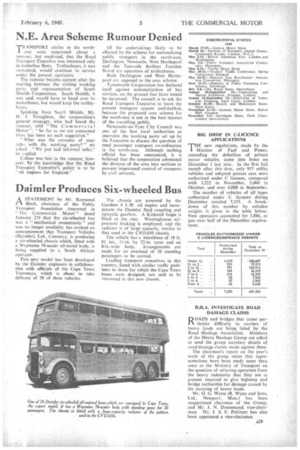N.E. Area Scheme Rumour Denied
Page 5

If you've noticed an error in this article please click here to report it so we can fix it.
TRANSPORT circles in the northI east were concerned about a rumour, last weekend, that the Road Transport Executive was interested only in motorbus fleets. Tralleybuses, it was rumottred, would continue in 'service under the present operators.
The rumour became current after the meeting between the visiting working party and representatives of South Shields Corporation. South Shields, it was said, would have to hand over its motorbuses, but would keep the trolleybuses.
Speaking from South Shields, Mr. H. I. Troughton, the corporation's general mareiger, who had heard the amour, told "The Co m merel a I Motor ": So far as we are concerned [Fiera has been no such suggestion."
" What was the outcome of your talks with the working party?" we asked. "We just had info-mint talks," he replied.
Cotour was refit to the rumour, however, by the knowledge that the Road Transport Executives galley is to be "oil engines for England." Of the undertakings likely to be affected by the scheme for nationalizing public transport in the north-east, Darlington, Newcastle, West Hartlepool and the Tees-side Railless Traction Board are operators of tralleybuses.
Both Darlington and West Hartlepool are opposed to the area scheme.
Tynernouth Corporation has declared itself against nationalization of bus services, on the ground that fares would be increased. The council is to ask the Road Transport Executive to leave the present transport system undisturbed, because the proposed area scheme for the north-east is not in the best interest of the travelling public.
• Newcastle-on-Tyne City Council was one of the first local authorities to interview the working party set up by the Executive to discuss the question of road passenger transport co-ordination in the north-east. Although nothing official has been announced, it is believed that the corporation advocated the division of the area into sections to prevent impersonal control of transport by civil servants.


























